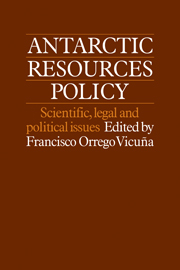Book contents
- Frontmatter
- Contents
- List of contributors
- 1 Antarctic resources policy: an introduction
- Part one The state of Antarctic knowledge and experience
- 2 Antarctica: its history and development
- 3 The living resources of the Southern Ocean: a scientific overview
- 4 The mineral resources of Antarctica: progress in their identification
- 5 Environmental factors in the development of Antarctica
- 6 Cooperation in the Antarctic: a quarter of a century's experience
- Part two The policy for the conservation of the living resources of Antarctica
- Part three The policy for the exploration and exploitation of the mineral resources of Antarctica
- Part four Issues on Antarctica and the law of the sea
- Part five The policy for Antarctic cooperation
6 - Cooperation in the Antarctic: a quarter of a century's experience
Published online by Cambridge University Press: 06 July 2010
- Frontmatter
- Contents
- List of contributors
- 1 Antarctic resources policy: an introduction
- Part one The state of Antarctic knowledge and experience
- 2 Antarctica: its history and development
- 3 The living resources of the Southern Ocean: a scientific overview
- 4 The mineral resources of Antarctica: progress in their identification
- 5 Environmental factors in the development of Antarctica
- 6 Cooperation in the Antarctic: a quarter of a century's experience
- Part two The policy for the conservation of the living resources of Antarctica
- Part three The policy for the exploration and exploitation of the mineral resources of Antarctica
- Part four Issues on Antarctica and the law of the sea
- Part five The policy for Antarctic cooperation
Summary
Man in the Antarctic environment
It could be said that the empty spaces of the polar regions bring out the best in men individually and the worst in them collectively. There is enough truth in such a statement to make it worth examining how, in the Antarctic over the last quarter century, man's better instincts seem to have gained the upper hand over his worser and then go on to enquire whether this phenomenon is likely to last.
Man is essentially alien in the polar regions. This arises from the fact that in the polar regions fresh water, for much if not all the year, is in the solid state. In the Arctic the indigenous peoples could not live without fire and their development was limited by the availability of combustible native animal fat. Technological man in the Arctic, and even more so in the Antarctic, is dependent for his survival on what he brings with him; cut off from his supply lines he could not sustain himself.
The hostility of the polar environment induces among individuals a recognition of the virtues of cooperation but it induces in men collectively, and particularly their governments, uncertainty about what to do with the polar regions. The fact that the polar regions generally, and more particularly the Antarctic, are not amenable to permanent, self-sustaining settlement has given rise to different views about whether they are amenable to ownership.
- Type
- Chapter
- Information
- Antarctic Resources PolicyScientific, Legal and Political Issues, pp. 103 - 108Publisher: Cambridge University PressPrint publication year: 1983
- 5
- Cited by



